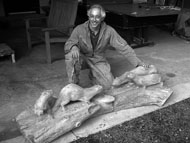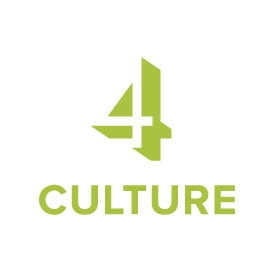Editor: Mark’s first interview was taken by Steve Sandry, and appeared in the March/April 1999 issue.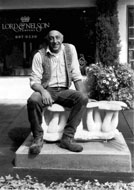
Mark: Let me start this interview by expressing my appreciation to association members past and present for their considerable efforts to promote stone carving and community. Together we have created a rare and wonderful organization. I salute those who have taken leadership roles, which like carving stone, takes real effort and patience. My thanks to you all.
SN: Who are you?
Mark: Like all of you, I am crazy about carving, utterly captivated! I’m so captivated that I’ve worked at crafting a lifestyle where I can carve every day. Realizing this goal has been a marvelous journey, now in its 34th year. Currently my sculpture studio is seated in a happy family nest. It is surrounded by organic gardens and orchard, enjoying full southern exposure between meadows and sky while surrounded by forested ridgelines. From this location I send a voice. All the creative energy flowing through me is translated into stone, bronze, and wood every day. I’ve made choices all my adult life that have brought me to this desired outcome: sculpture has become the cornerstone of my life’s work.
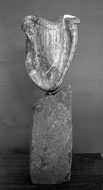
SN: What is your life history as it relates to being an artist?
Mark: My first knife handiwork was acquired when I was a Boy Scout. I still have a 3 inch slash scar on my thigh to remind me of my early attempts to master carving with the grain. In the late 1960’s, my family moved to Europe for two years. That was an eyeful and you can imagine how all the millennia of carved stone, wood, and bronze work really carried me away. Check out my l999 interview for the details.
SN: What key life experiences affected your direction in art?
Mark: Several years into the University Of Oregon School Of Architecture, I realized that it was not the building so much as the decorative ornamentation of buildings that I was in love with. A move to the sculpture department produced my first mentor, Paul Buckner. I had been back to Europe in the quest for carving instruction and returned with no lessons but a well-stocked tool roll of Swiss chisels. Those tools and Buckner became the “bookends” of my college experience and the foundation of my sculpture career.
Other key experiences include a year long private apprenticeship to a world champion bird woodcarver in Florida, and a half dozen years carving like a madman while keeping expenses low on a rural Oregon commune in the early 1970’s.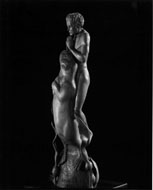
My family was growing and the 1980’s and ‘90’s were years of intense activity for sculpture as well. In my quest to carve, I took every job that was studio related. I learned to diversify from wood to stone and then to reproductions in bronze. I zipped in and out of side jobs, even donned a jacket and tie to understand gallery sales from the inside. Always striving, always learning, assembling bits and pieces to create a carving and sculpture scenario unlike anything I could have imagined in the beginning.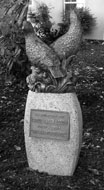
Creating art is channeling energy. I like to think of carving not so much as just pounding, but as personally vibrating with the cosmic life force. When we are open and creating fluidity we create a force that feeds this planet. Art is Life. Life is Art.
SN: How has NWSSA influenced your work as an artist?
Mark: Anyone who has been to Camp Brotherhood knows this symposium has far reaching effects on those who attend. Before Camp B in 1998, I was producing alabaster works using wood carving chisels and files; my learning curve was very steep! I was encouraged to tool up (of course!) and tackle larger stones. The first big blocks of limestone were a thrill and fulfilled that deep desire to understand the effort required to create the historic statuary that had influenced me in Europe.
From 1999 through 2001, I stepped up to direct the Silver Falls Symposium and met terrific people and devoured every tool demonstration. Through the association I have had access to a rich pool of advice and encouragement. These very ingredients gave me the confidence to pursue the 44 ton basalt boulder sculpture sited in Lake Oswego last year.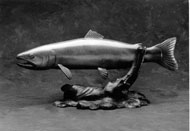
Although the almost life size limestone pair of Northwest Native Americans, “Berry Baskets” and “Salmon Spirit Speaks,” are still unsold, they have been actively displayed in sculpture parks since their creation. “Berry Baskets” has just returned from Westcott Bay Sculpture Park on San Juan Island, where she was photographed for inclusion in last month’s “Southwest Art” magazine. Was I surprised! “Salmon Spirit Speaks” is on display in Puyallup, Washington, by the Downtown Arts Association. A member of the Puyallup Tribal Council purchased a bronze cast of the half scale working model, offering an appropriate home for that artwork.
NWSSA has also led me to opportunities in the Seattle area. When applying for Percent for Arts installations on new buildings, I always include stone in my designs. The opportunity to create stone carvings for the Northwest has been greatly enhanced by the Marenakos Rock Center. Their open encouragement of the stone carving tradition will funnel work to existing artists and encourage a regeneration of interest in local talent. I especially welcome the opportunity to rent space and produce carvings at the stone yard. It’s good for the soul to be close to the source of the stone.
Finally NWSSA has shown me that there are other carvers sprinkled throughout the land, each with their unique and inspirational tale to tell and perspective to share.
SN: Describe your art in your own terms – focusing on your stone carving.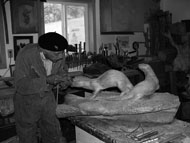
Mark: My creative quest uses all the usual basic artistic principles of balance, positive/negative space, shadow, perspective, et al. I’ve integrated the lessons I’ve been exposed to, and have kept my nose buried in creating new work. Survival in the studio has been my foremost concern, so my artistic style tends to become the reflection of the client’s need; I aim to make the commissioning experience very positive. My “earn while you learn” mantra has taken me down many roads!
At the core of my art is an appreciation of the natural world. I carve flora and fauna in an effort to understand them. I am filling myself up with the essence of my subject and interpreting it sculpturally in a durable material. In carving stone, I am literally using up my physical body to produce images in hard material for future generations. It’s a heady assignment! But, in reality, I am following humbly in the footsteps of the past, keeping an ancient art form alive.
SN: Why do you continue to carve?
Mark: For me, carving is a visual, physical, and emotional link to the spirit world. A powerful energy is created during the sculptural process. This energy is good and it travels through time doing good. Carving never ceases to amaze because it is so dimensionally exciting to look at, and, by golly, it takes a lot of work! Through stone, the artist can move into the future. It is life after death. Perhaps I try to keep creating in the hope that at least some of my visionary carving will survive far into the future, keeping alive that personal impassioned spark made manifest when the art was created.
SN: Where do you carve?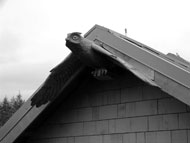
Mark: For the past three years I’ve been home, home, home. And, boy, it does a man good. I love having the weather influence my work schedule. I enjoy the roll of the seasons and the fullness of harvesting terrific food at home. The garden is the perfect sculptor’s gymnasium. Carving compacts the muscles, whereas the garden stretches the body and soothes the senses.
SN: Tell us a little about your commission work.
Mark: A few years back, I helped a local foundry expand. We did the gritty work of casting large bronzes while building new rooms and training people. My co-workers have remained strong allies. They always give me great effort and steer good commissions my way as people find the foundry and have special needs.
It is interesting for me to notice that I receive very little commissioned stone carving. I will turn to a stone in between jobs or during some smelly part of mold making when I need the physical release of manual carving. With only me, the block, and direct effort, I ride the raw energy on the creative edge of carving direct and “in the moment.”
Editor: The commissions coming from the foundry and Mark’s studio clearly demonstrate the diversity of his abilities. By way of illustration, Mark has produced, among other works, the eight foot long carving (shown here) of 4 river otters preparing for a salmon dinner, a series of 4 inch square bronze Gothic Tiles and a 40 inch long marble carving of four swimming salmon.
SN: Are you a planner or do you do direct carving?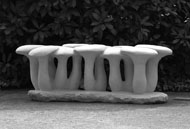
Mark: Carving direct with no planning? I love it! I would love to embrace it and surrender completely to that muse. Very likely my usual approach is too structured. But, with the goal of producing the best work possible for a livelihood and to be able to stay in the studio, I have developed a structure that has delivered me to the present. There are so many ideas out there, all I have to do is reach out and pluck one as I look at each stone. Then I look at the stone from many different angles to determine its volume and density to see if the idea fits the piece.
I have stone blocks that call me daily and decades worth of wood tree sections all begging. How I wish to clean the whole area by carving each and every one!
SN: Do you teach art?
Mark: I have taught carving in the past, to adults and children in classes large and small. I still teach upon occasion, but conditionally. Now the studio apartment I built for an assistant is my wife’s bed-and-breakfast business, so we can offer an artist the use of the B&B while carving in my studio or paying me by the hour for instruction. We could also do a mini-symposium offering guided instruction, personal carving time, and then a great breakfast served in the morning. The room has a full kitchen and private bath.
I enjoy teaching what I have learned, but perhaps most inspirational is when we teach each other while working together; in this way we support and expand a quality environment for stone carving in the Pacific Northwest. See you at Silver Falls!